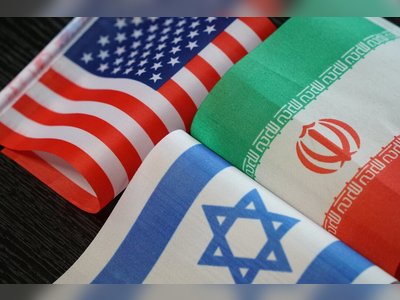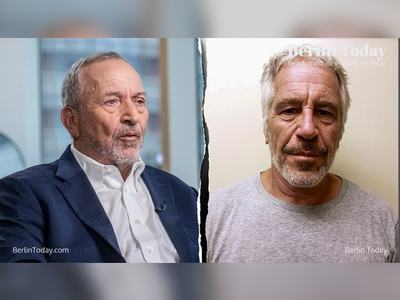EU Diplomats Address Growing Concerns amid Ukraine Conflict and Domestic Violence Surge
EU officials strengthen support for Ukraine while responding to escalating gang violence and firearm proliferation across Europe.
As the conflict in Ukraine persists into its third year, European Union (EU) diplomats are faced with an array of pressing issues, including heightened gang violence within member states.
The situation has prompted EU officials to reaffirm their commitment to supporting Ukraine while simultaneously addressing growing domestic safety concerns.
The EU’s chief prosecutor has voiced significant apprehensions regarding the increasing availability of firearms across Europe, describing them as 'weapons of war.' This statement emerges against a backdrop of escalating gang-related crime, particularly in major European cities, where criminal organizations have gained more leverage and power.
The rise in violent incidents coincides with ongoing instability caused by the Ukraine conflict, which has significant implications for the safety and security of EU citizens.
In a show of solidarity, EU leadership, including the High Representative for Foreign Affairs, Josep Borrell, is slated to visit Kyiv in the coming days.
This visit aims to reaffirm the EU's commitment to Ukraine amid the ongoing Russian invasion, highlighting continued diplomatic efforts in support of Ukraine’s sovereignty and territorial integrity.
This diplomatic engagement comes in the context of ongoing discussions among international leaders.
U.S. President Joe Biden and Russian President Vladimir Putin have resumed talks as the geopolitical landscape evolves, with concerns over the appropriate responses to Russia’s actions in Ukraine dominating the agenda.
Amid these discussions, Borrell has publicly criticized former U.S. President Donald Trump for endorsing what he has termed 'appeasement' toward the Kremlin.
Such remarks underline the divergent perspectives within the West regarding policy measures aimed at addressing Russia’s military aggression.
Hungarian Prime Minister Viktor Orbán has also recently commented on the EU's strategy concerning Ukraine.
He characterized the EU’s current approach as 'morally and politically unacceptable,' reflecting the varied opinions among member states on the best course of action in response to the crisis.
On the frontlines of the conflict, Russian forces have intensified military operations, conducting drone attacks that have led to civilian casualties in regions like Kherson.
Reports confirm that residential areas have been targeted, exacerbating the humanitarian crisis and raising alarm among local residents.
As the EU navigates these complex challenges—balancing the need for external conflict resolution with internal stability—the intricate security landscape necessitates ongoing diplomatic dialogue and cooperation among member states and international partners.
The situation has prompted EU officials to reaffirm their commitment to supporting Ukraine while simultaneously addressing growing domestic safety concerns.
The EU’s chief prosecutor has voiced significant apprehensions regarding the increasing availability of firearms across Europe, describing them as 'weapons of war.' This statement emerges against a backdrop of escalating gang-related crime, particularly in major European cities, where criminal organizations have gained more leverage and power.
The rise in violent incidents coincides with ongoing instability caused by the Ukraine conflict, which has significant implications for the safety and security of EU citizens.
In a show of solidarity, EU leadership, including the High Representative for Foreign Affairs, Josep Borrell, is slated to visit Kyiv in the coming days.
This visit aims to reaffirm the EU's commitment to Ukraine amid the ongoing Russian invasion, highlighting continued diplomatic efforts in support of Ukraine’s sovereignty and territorial integrity.
This diplomatic engagement comes in the context of ongoing discussions among international leaders.
U.S. President Joe Biden and Russian President Vladimir Putin have resumed talks as the geopolitical landscape evolves, with concerns over the appropriate responses to Russia’s actions in Ukraine dominating the agenda.
Amid these discussions, Borrell has publicly criticized former U.S. President Donald Trump for endorsing what he has termed 'appeasement' toward the Kremlin.
Such remarks underline the divergent perspectives within the West regarding policy measures aimed at addressing Russia’s military aggression.
Hungarian Prime Minister Viktor Orbán has also recently commented on the EU's strategy concerning Ukraine.
He characterized the EU’s current approach as 'morally and politically unacceptable,' reflecting the varied opinions among member states on the best course of action in response to the crisis.
On the frontlines of the conflict, Russian forces have intensified military operations, conducting drone attacks that have led to civilian casualties in regions like Kherson.
Reports confirm that residential areas have been targeted, exacerbating the humanitarian crisis and raising alarm among local residents.
As the EU navigates these complex challenges—balancing the need for external conflict resolution with internal stability—the intricate security landscape necessitates ongoing diplomatic dialogue and cooperation among member states and international partners.
AI Disclaimer: An advanced artificial intelligence (AI) system generated the content of this page on its own. This innovative technology conducts extensive research from a variety of reliable sources, performs rigorous fact-checking and verification, cleans up and balances biased or manipulated content, and presents a minimal factual summary that is just enough yet essential for you to function as an informed and educated citizen. Please keep in mind, however, that this system is an evolving technology, and as a result, the article may contain accidental inaccuracies or errors. We urge you to help us improve our site by reporting any inaccuracies you find using the "Contact Us" link at the bottom of this page. Your helpful feedback helps us improve our system and deliver more precise content. When you find an article of interest here, please look for the full and extensive coverage of this topic in traditional news sources, as they are written by professional journalists that we try to support, not replace. We appreciate your understanding and assistance.











